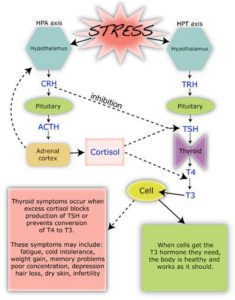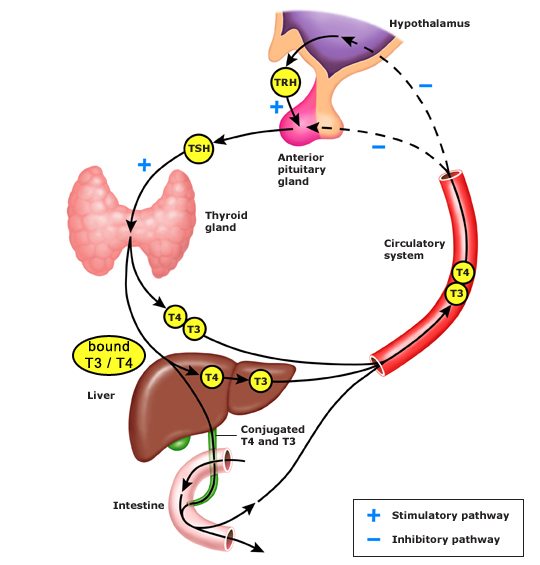A whopping 13 million Americans, perhaps 40 percent of women, may be misdiagnosed for thyroid conditions or imbalanced thyroid hormones. You have symptoms but blood tests are “normal” OR your thyroid is healthy but a screening test is “out of normal range.”
Why? Because most doctors only ask how much Thyroid Stimulating Hormone (TSH) your pituitary is making. Here’s the problem:
TSH or Thyroid Stimulating Hormone is made by the pituitary gland when the body needs more energy, or needs to warm up, or needs to handle a recent infection, or various other numerous reasons. TSH should go up when you are cold, it cycles throughout the day, it is normal for it to change.
While many health problems may be caused by an improperly working thyroid; a TSH test may not show it.
In fact, it is nearly useless to get a TSH test alone. Read my article on
Is the thyroid gland malfunctioning? Something else?
Many health problems can cause a thyroid to work improperly, and many symptoms that seem like a slow or fast thyroid are some other organ entirely. The body is a complicated web—everything is connected to everything!
According to Guyton’s Textbook of Medical Physiology, the thyroid does these things:
- simulates all aspects of carbohydrate metabolism, including rate of absorption from the GI tract, glucose uptake by cells, and even insulin secretion
- all aspects of fat metabolism
- blood cholesterol and triglyceride levels
- vitamin metabolism: vitamin deficiencies can be caused by excess thyroid hormone (including hormone medicines)
- causes weight gain or loss
- increases or decreases the basal metabolism of the body
- blood flow, cardiac output and the strength of your heart beat
- effects heart rate: causes rapid heart beat (tachycardia) or very slow heart beat (bradycardia)
- blood volume and blood pressure
- respiration ability and rate
- appetite, rate of secretion of digestive juices and the motility of the GI tract (constipation or diarrhea)
- central nerve system: nervousness, anxiety, worry, paranoia, moods…
- muscles: sluggish, weak, or too tense
- fine muscle tremor and muscle tone
- sleep (too much sleep as well as can’t sleep/wake up a lot)
- affects all other endocrine glands
- sexual function (libido)
This is why, with Nutrition Response Testing, we look at all organs in relationship to each other. We find and fix the effects of food toxins, heavy metal and chemical toxics, viruses, bacteria, parasites, yeast, and even body scars.
We treat you, the person with your unique situation, not the symptom.
Your thyroid symptoms aren’t “all in your head”
All too often, thyroid misdiagnosis may mean you’re given medications for something else—often depression. This only makes matters worse. According to a recent report from MedCo, a whopping 30 percent of the women aged 35 to 60 who are taking pills to fight depression are doing so because of misdiagnosed hypothyroidism.
Anti-depressants have many side effects including more depression, suicidal or homicidal thoughts, weight gain, irritability and sexual dysfunction. This is no better than the weight gain, libido trouble, irritability, depression low energy and other symptoms of a sluggish thyroid.
Why is a thyroid condition so commonly mis-diagnosed?
In part, it is a reliance on TSH to diagnose thyroid disease.
Research shows that relying on a pituitary hormone to evaluate the condition of the thyroid can be as much as 60% inaccurate. Many people with true thyroid problems and obvious thyroid symptoms are told their thyroid is OK when it isn’t. Many others are put on thyroid medications they don’t need or when there is something else causing an improperly functioning thyroid.
After all, what is “normal range”? In 1973, 200 people had their TSH measured and the findings were used to determine that “normal” is 0.5-5.0 mU/L. To what extent were many of these people already slipping into various thyroid problems? Is this range “healthy?” or just “typical?”
This one-size-fits-all, cookie-cutter approach to your thyroid challenges is truthfully poor medicine. It is not as simple as TSH low, thyroid fast or TSH high, thyroid slow. In the world of hormones and hormone-producing organs, “anything can cause anything” has never been more true.
Doctors must train themselves to take a deeper look at what is going on.
What if the pituitary itself is the problem? Or something else in a huge interacting web?
Hormones are chemical messengers sent in the blood to make things happen in other organs. When that organ now does what it is suppose to do, it “answers” with another hormone that says “OK, I did it” in a coordinated feedback loop. Levels of your thyroid hormones change every hour of every day throughout the events, phases and cycles of your lifetime; never is it one isolated hormone, health involves many hormones all operating in coordination.
Your pituitary gland, the size of a pea, makes hormones for growth, water retention, to stimulate adrenal gland production of cortisol (also known as the “stress hormone”), development of gender organs, and to coordinate changes during pregnancy and after birth.
Thyroid hormones regulate energy level and energy production in every cell of your body. This includes how well your body uses fats and carbohydrates, body temperature and heart rate. Your thyroid also makes a hormone that maintains correct levels of tissue calcium.
When something in this huge web of interaction, feedback, coordination and cross-regulation isn’t right, the symptoms can be very diverse, far-reaching and different from person to person.
Understanding the web of thyroid hormones:
TSH (Thyroid stimulating hormone) is made by the pituitary, not the thyroid. TSH is made when the pituitary receives signals from the body that it’s time to increase energy. Time to burn more fuel. Time to get up and go. Like, for example, in the morning when you wake up; or when your body needs to stay warm; or burn off that spike in blood sugar.
Take your TSH first thing in the morning when you’re waking up and just walked across a cold parking lot to the clinic… it might just be a little high—that would be a normal body response—not a slow thyroid. For this reason, although it gets very expensive, good endocrinologists will run a panel of thyroid tests.
Responding to TSH, your thyroid makes several thyroid hormones: T4 (thyroxine, and a little T3 or tri-iodothyronine) and releases these into the blood mostly bound to large proteins. T4 is inactive. It must be unbound from the protein and then converted by an enzyme to the active T3 form.
These enzymatic conversions, done mostly by the liver, need key minerals—especially selenium and zinc. For some people, correcting digestion, leaky gut and/or candida infections now allows proper mineral absorption, corrects the deficiency and voila! end of thyroid symptoms.
 And don’t forget the hypothalamus as a producer of TRH (Thyrotropin Releasing Hormone) that tells the pituitary to make TSH to tell the thyroid to make thyroid hormones that need the liver to convert to T3…
And don’t forget the hypothalamus as a producer of TRH (Thyrotropin Releasing Hormone) that tells the pituitary to make TSH to tell the thyroid to make thyroid hormones that need the liver to convert to T3…
Lastly, the active T3 needs to make it safely to the cells where it is needed—but high stress and high cortisol—or autoimmune activity—can deactivate the T3. Assuming the T3 is activated and makes it through the blood to cells, another process that requires certain minerals and vitamins will allow T3 to bind and enter the cell and ultimately deliver its “wake up and get going!” message.
Each and every one of those factors—too much carrier protein that binds the inactive T4 or T3 thyroid hormones, non-functioning enzymes, insufficient vitamins and minerals to allow the enzymes to work, high stress and cortisol, autoimmune processes (and there is one for just about every thyroid hormone step)—all these factors can produce the appearance of an under-working thyroid whether by symptoms or measured by elevated TSH.
That is a lot of steps in feeling normal, a lot of blood work should you choose that route, and a lot of expertise in correct interpretation.
In other words, whether you take Synthroid (medical thyroxine-T4) or “bio-identical hormones” (which really aren’t identical) or “natural” thyroid hormone like Armour, there are still many hurdles and steps before you feel better. Unfortunately, none of these products fixes the real problem—which step or steps is blocked and why?
In fact, millions of women take thyroid hormone and are being treated by a doctor but still have symptoms, are still in abnormal TSH range and the medical world will just increase the dose.
Let’s actually do something about it.
Rather than give you a drug to control a symptom, or even remove the body part, doesn’t it make sense to find out what is causing it and fix that? There may be many layers, especially with a thyroid condition, at the end of your journey you achieve true health.



Leave a Reply
You must be logged in to post a comment.